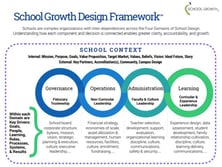
My Pain, Your Gain: A Painful Experience that Illustrates how Planning for Schools is Different
 One of the worst experiences I had as a school administrator was enduring the agony of a strategic planning process led by business consultants who didn't understand the complexities of schools--especially the relationships involved.
One of the worst experiences I had as a school administrator was enduring the agony of a strategic planning process led by business consultants who didn't understand the complexities of schools--especially the relationships involved.
In the end they did more damage than good, leaving me with the challenge of restoring trust and trying to maximize the benefits that could be gained anyway.
________________
We needed to renew our long-term plan, so the board and I went through the normal steps of identifying consultants who had the reputation and experience we felt was needed for our school.
The recession that started in 2008 took a heavy toll on our community, decimating housing values and forcing families to reconsider their educational options. This school was in an already very competitive school market, and the economic downturn made it even more so.
Bringing in expert help to create a strategic plan was a significant investment. One of our school board members made a very generous offer to fund the strategic plan ONLY IF we would use the company their family had used previously for providing such services for another non-profit. After interviewing this firm, we collectively decided to accept these conditions.
And that was the beginning of one of the most stressful and exhausting years of my life.
This story could go on for many paragraphs, so let me summarize the lessons learned and then we can have a conversation if you want to know more about the details--especially how to determine the best way to start your growth plan.
Lesson #1: Schools are Different
While many of the techniques of effective strategic planning are portable across industries, the structure and dynamics of educational institutions are unique. These differences aren't just contrived in order to insulate school leaders from change and outside guidance.

Strategic planning for a school should be tailored to the specific context, including the unique strengths, structures, relationships, history, and community of the school. The planning team must also understand the inter-relationships of the Four Domains of School Design along with the Seven Drivers that define the organization. Schools are different.
Lesson #2: Boundaries are Different
The strategic planning process for a school must consider the boundaries between governance and administration/management, along with the importance of setting accurate expectations for parents, faculty, alumni, and others who may be invited to contribute to the dialogue. Involving the school's stakeholders can be valuable and productive IF the forums are managed wisely.
Those involved in funding this initiative later revealed alternative motives that undermined trust among the board and administration. Careful management of donor goals and expectations is another lesson learned from this experience.
Lesson #3: Relationships are Different
The very nature of the relationship with employees (teachers, staff, coaches, etc.), clients (parents, students, grandparents, guardians), and funders (donors, bank(s), etc.) is absolutely different in schools from other types of businesses or organizations because of:
- Sharp variations in perceptions/expectations
- The emotional fear and mistrust that is too common, and
- The language/cultural barriers that frequently impair communication.
Ignoring these critical relationship differences is a big risk to the planning process, which is why business consultants without deep education experience can often cause considerable disruption to a school.
________________
The journey of completing a strategic plan should be as valuable as the resulting documentation because of the meaningful engagement that can be achieved. The goal is to create a strategic vision to embrace for the future, while also equipping the leadership to achieve it through short-term tactical planning that produces breakthrough momentum and results.
It is through this difficult strategic planning experience from years ago, and from our work with thousands of schools over the last decade, that we created a data-driven strategic planning process that uncovers the individual and organizational strengths of the school to create a plan that delivers an exciting path forward.
No matter the size of your school, planning can be an affirming, community-building experience when it's done right.
Are you ready to Start Your Growth Plan?

.png?width=1000&height=199&name=SG-Logo3-Transparent-1000x199px%20(1).png)




